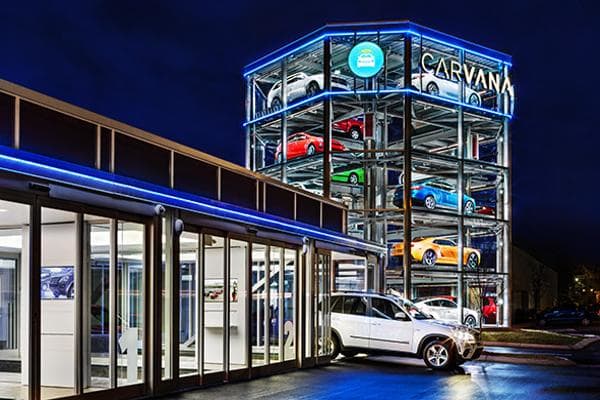
Online car dealer Carvana is just a shadow of itself.
Gone is the dream of a future where buying a vehicle online would become the principal, if not the only option.
All that remains is a gray board with numbers that tell the story of how the dream turned into a nightmare.
The last number is scary. Carvana (CVNA) shares tumbled 39% to $8.76 during the Nov. 4 session on Wall Street, the last session of the week. This daily drop translated into approximately $992 million of lost market value. The company only has a market value of $1.56 billion.
Two other figures recount the misfortunes of Carvana, known for its car vending machines.
A $1 Stock
Let's go back to Dec. 31, 2021. We are still in a pandemic, even though parts of the economy are reopening. The online vehicle dealer had a market value of $20.84 billion. But less than a year later, an estimated $18.4 billion has been wiped out, leaving Carvana in a more fragile and vulnerable state than ever. Carvana share prices have fallen 96.2% since January.
Things will continue to deteriorate according to Morgan Stanley analyst Adam Jonas, who sees Carvana stock falling to $1. Until now, his target price was $68.
For Jonas, one of the most respected analysts in the automotive sector, many factors work against the firm. There is a drop in market prices for used vehicles. Used vehicle prices soared over the past two years as consumers shunned public transport due to the covid-19 pandemic and many city dwellers moved to the suburbs where it is necessary to have a vehicle for their daily needs.
In addition, the used car market benefited from a shortage of parts which affected the manufacturing of new vehicles.
Central bank interest rates were also close to zero, making auto loans cheap and easy to get. Finally, the federal stimulus programs enabled consumers to acquire used or new vehicles at higher prices. This environment was thus favorable to automobile dealers, including Carvana.
But now, the economy is slowing down. The Federal Reserve has been raising interest rates since March to fight inflation, which is at its highest in 40 years. This has increased the cost of credit and threatens to plunge the economy into a recession, according to economists. Consumers are less inclined to spend, and monitor their bank accounts a little closer as cars have become less affordable.
'Extremely Optimistic'
"Industry demand interest rate and depreciation headwinds are slowing our progress on overall profitability," co-founder and CEO Ernie Garcia told analysts during the third quarter earnings' call on Nov. 3. "We made gains here, but they were slower than we would have liked. And these headwinds are likely to persist over the near term making precise forecasting of that progress more difficult."
"There are three key headwinds that we are facing right now, industry level demand, interest rate increases and vehicle price depreciation," he added.
Despite these difficulties, Garcia ruled out the idea that Carvana needed new funds immediately.
"Ernie, does the business need more equity capital? And would your family consider giving up control if that was required to maintain the company as a going concern?" Jonas asked him during the call.
"Our goals are going to be on driving down expenses and trying to get positive EBITDA as quickly as we can," Garcia responded, referring to earnings before interest, taxes, depreciation and amortization, which helps investors to gauge the financial health of a company.
"We've got a bunch of committed liquidity. We've got a bunch of real estate. And I think that we feel like that puts us in a good position to ride out this storm. And we're making great moves inside the company."
Garcia added: "So I think that we're extremely optimistic about riding all that out. And then I just think as it relates to hypotheticals, we'll stay away from those. We're just going to keep running our play and moving forward."
In the third quarter, Carvana's revenue fell 2.7% year-on-year to $3.4 billion, while net loss jumped to $283 million from just $32 million in the third quarter of 2021, the company said in a letter to shareholders.







